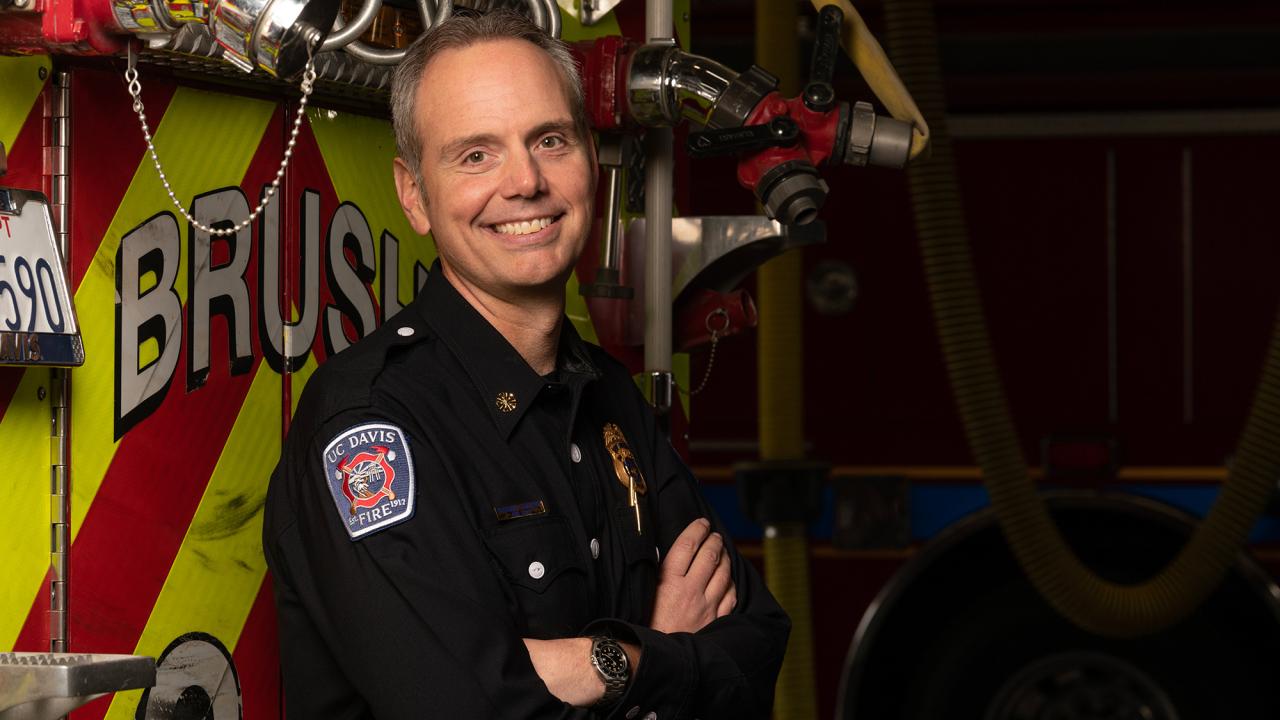Newly appointed UC Davis fire chief Nate Hartinger ’00 identified his career path by the time he graduated with dual degrees in communication and sociology. He’s since worked with the campus fire department for 25 years and counting.
After a nationwide search and serving as interim fire chief for nearly a year, Hartinger was announced as the new UC Davis fire chief in August, an achievement Chancellor Gary S. May said reflected Hartinger’s “commitment to service, a collaborative spirit and a deep love for this community.”
We checked in with Hartinger as he embarks in his latest era with the campus community.
How did you find this career path? How are you feeling about becoming the new fire chief?
As an undergrad, I wasn't sure what direction I wanted to go, [but] college was a great opportunity to explore who you are and realize what opportunities are out there. I was a whitewater rafting guide for Outdoor Adventures; I still spend time on the river with some of the people I met there, 25 years later. I also worked at the Craft Center as a student manager.
UCD Fire has a student firefighter program that includes an academy and real-world experience responding to emergencies. I was fortunate to find this program and spend a little over a year training and learning. I really found a passion for firefighting and my calling.
[After college,] I worked on an ambulance company to get experience in the medical field and then came back [to UC Davis] as a career firefighter in 2001. I've been here ever since.
There are a lot of different roles that the fire department plays, such as programs like Health 34, which offers free mental health support for students in need. How has the fire department’s roles and responsibilities evolved across your career?
I think a lot of what the fire service does is respond to community needs. We're problem solvers. A growing portion of our call volume is medical in nature. And with the development of Health 34, [we’re] making sure that we're able to support our community in their time of need. Our Health 34 folks are much more subdued. They don't show up in a big fire engine or wearing a uniform with a badge on it; they often wear scrubs or regular clothes. The idea is to meet people where they’re at. If they don't have money to buy food, we can make sure you have a hot meal. If you don't know where they’re going to sleep that night, we can figure out a place for you to go to, for the evening, where you have shelter.
We're always trying to push the envelope to see what we can do better. We're working to increase cardiac survivability. Cardiac death is not just an older person’s disease; there's a risk to all ages. Whether it is teaching CPR to everyone on campus or running our AED program, we're constantly pushing to be better. We’re also always trying to get response times down, both from us and from the advanced life support ambulance companies that respond to campus.
We are always hyper-focused on quality. We are partnered with the resuscitation academy, which advocates best practices in cardiac arrest response to improve survival rates [and] support a patient’s return to a productive and happy life.
Members of the fire department were helping combat wildfires in different parts of the state. How does your team work with larger state entities?
We work as part of the mutual aid system within California and respond all over the state when requested. We respond multiple times a year. Last year, we had about six responses. [Earlier this summer, we had] a fire line EMT at the Garnet Fire in Southern California, where his goal is to provide safety to the restoration group that is trying to restore the fire burn area. We often respond as part of the Yolo County strike team.
What are your future goals for UC Davis Fire?
We're hyper-focused on making sure that we're always doing the best that we can do at everything that we do. When you call 911 and a crew responds and things run smoothly, it might seem like they showed up and figured it out on the fly. But all of that is a product of training. Calmness is a skill. We do a lot of training to make sure that we can respond as efficiently and effectively as possible. We're also focused on trying to address newer emerging needs like increased cardiac survivability, the resuscitation academy and Health 34. Everything we do is about service to the community.
Ultimately, our success is because of our people. Having high quality, dedicated, caring individuals is really what makes this an amazing place.
